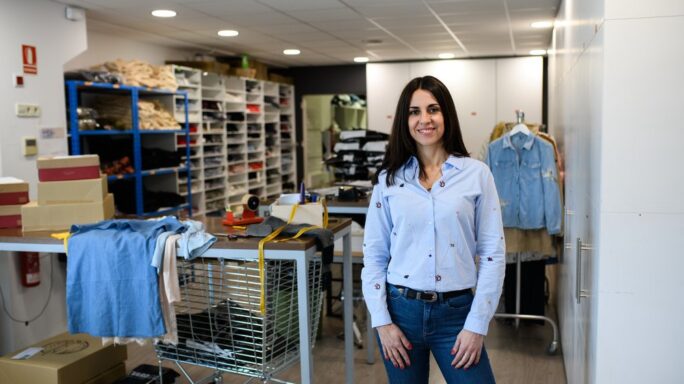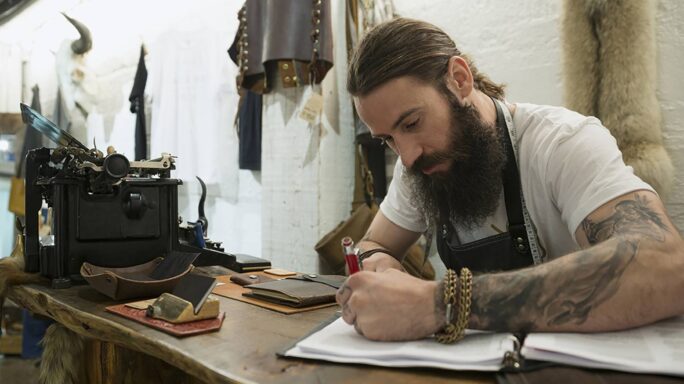Strategy, Legal & Operations
Hanx: How to choose the right manufacturer for your business
Sarah Welsh and Farah Kabir felt that there was a gap in the market when it came to condoms marketed at women.

Looking for the right manufacturer for the products your business creates? It can be tricky to get the correct fit. In this interview, which is a part of a series in partnership with content creators the Startup Van, Sarah Welsh, a co-founder of condom company Hanx, shares her experiences and advice on how to choose the right manufacturer.
Purpose, passion and doing something different
Turning an idea into a viable, profitable business is a challenge, but certainly possible. An important ingredient is passion – although money is obviously key, there should be a purpose to what you bring to market. There must also be a key differentiator about your idea to establish your story to a market you can connect with.
Sarah Welsh is the co-founder of condom startup Hanx, and accomplished medical doctor, with experience in gynaecology and sexual health.
Sarah and fellow co-founder Farah Kabir felt there was a gap in the market when it came to condoms marketed at women, and some important societal reasons for building a new business.
According to Statista, the value of the condom market worldwide is expected to increase from $6bn in 2015 to $9.6bn in 2021. Growing awareness and demand for contraceptives is driving condom market growth worldwide.
Condoms not only prevent the spread of diseases but potentially limit birth rates. With urbanisation, marketing, innovate packaging and even the introduction of innovative condom designs, there’s an opportunity for a startup like Hanx – a startup that creates luxury vegan condoms that “aims to speak directly to women with a stylish design that you’re proud to purchase, carry and use”.
“At the time, I was working in sexual health clinics, where we would see infections which were difficult to treat and unwanted pregnancies time and time again,” says Sarah.
“I’d be seeing women who were too embarrassed to use condoms – the only safe non-hormonal form of contraception.
“Farah and I talked about how buying condoms was embarrassing and a bit of a taboo topic for women. Walking down a typical shopping aisle, you’ve got garish packaging that doesn’t speak to them.
“We felt there was definitely something we could do to change the market where packaging often promotes male conquests – not something you would like seen in your handbag or bathroom.”
Turning the idea into a functioning business
Sarah and Farah were both in particularly busy and stressful full-time jobs at the time, so it was challenging to start a business in the spare time they had. But it certainly isn’t impossible.
They found ways of cutting down their hours gradually, until there became a tipping point where they had funding available to run the business without their full-time job obligations.
Research and understanding the market you want to enter is crucial. Passion is not enough – you must look at potential competitors, evaluate your idea and get insight into how you can stand out.
The co-founders of Hanx knew this was important, so they did their market research. Speaking to more than 2,000 women, they found there was a lack of brands that focused on sustainability or offered vegan products, as well as insight around distaste for garish packaging and the smell of latex.
Sarah says: “The research is super important and pivotal, as a great idea is pointless without demand. It’s important to know that there’s a market for your product, and people want to buy something you’re building.
The fact that there was such a demand for the Hanx product was the trigger for us to quit our jobs. If our research hadn’t found that, we would have to change things or do something differently.
With a better understanding of the market, Sarah and Farah worked on how they would outsource the manufacture of the Hanx product. They needed a partner that had the experience, certification, legal requirements and medical testing necessary to build the condom that they would design to their unique specifications.
Startup Stories
Facing business challenges and want some inspiration to overcome them? In this free guide, a group of business owners share their experiences and offer advice that can help you keep moving your business forward.

Finding the right manufacturer for Hanx
“The manufacturing stage was tricky and took a lot of time, but was worth the effort,” Sarah reveals. “We had to look far and wide for a condom manufacturer, as there were specific things we wanted with the product.
“For example – the scent was important. We didn’t want the condom to smell of latex. We wanted a clean smell – little bit like Nivea.
“Finding a vegan-certified manufacturer was also tricky, as many condom manufacturers use an animal by-product called casein in their products. We looked in many countries with latex plants and finally settled in one from Germany.
“We hit it off, made a few visits and felt comfortable that the quality and specification of what they could make for us was exactly how we wanted it.
“Although the price may have been slightly higher than other areas, the Hanx condoms needed to be exactly how we specified, especially as it’s a medical device.
“As well as the medical certification, all condom components will be traceable. As a well-established factory, our partner has lot numbers and batch numbers on all condoms on foil and packaging, so there’s traceability in case of any issues.
“Testing is also rigorous. There’s pinhole and pressure testing where they are filled with water and air. If there’s a fault in any condom, the whole batch gets rejected.”
Facing up to the big startup challenges
Building a brand and a new product is a challenge and Hanx is looking to create a new audience, face up to certain taboos about contraception, which some retailers find difficult to deal with. There’s also the challenge of networking, meeting the right people and pitching to investors.
Sarah says: “We have some fantastic advisers who we meet regularly. They are great for high-level strategy and funding.
“We also have an intern who has been fantastic, helping with blogs, marketing, PR and social media, for example. It’s essential, because Farah and I are still learning all the time.”
Interested in the Hanx story and looking to start your own business? Here are three points to take away from Sarah and Farah’s experience.
1. Have passion for the project
Starting a business can be very time consuming to get off the ground, particularly if you’re working a full-time job at the same time. To motivate yourself, you will need passion for what you’re trying to do, especially as there will be lows as well as highs on your journey.
Sarah knew that with the company she and her business partner wanted to set up, she would be doing a lot of good for an audience who may have difficulties in picking up the contraception they need and keeping in good sexual health.
2. Do the research
Having a great idea and a super product is useless unless there’s an audience out there who will buy what you’re selling.
Sarah knew there was a market out there for the Hanx condom from her own background, as well as market research that she commissioned examining what the attitudes of her potential audience were. This evidence was vital to her being able to quit her job and move forward with the project.
3. Have trust in your suppliers
It’s important you have trust in suppliers, particularly if you’re in an industry where you’re selling contraceptive products that can be the difference between having an unwanted baby or sexual disease.
Sarah and her business partner were very careful about the manufacturer they chose to create the product they wanted, making sure that they had the right certifications, were following the right regulations and could produce exactly what they demanded.
Startup Stories
Facing business challenges and want some inspiration to overcome them? In this free guide, a group of business owners share their experiences and offer advice that can help you keep moving your business forward.







Ask the author a question or share your advice